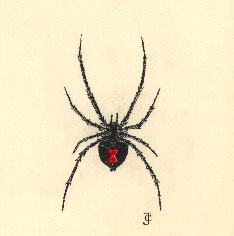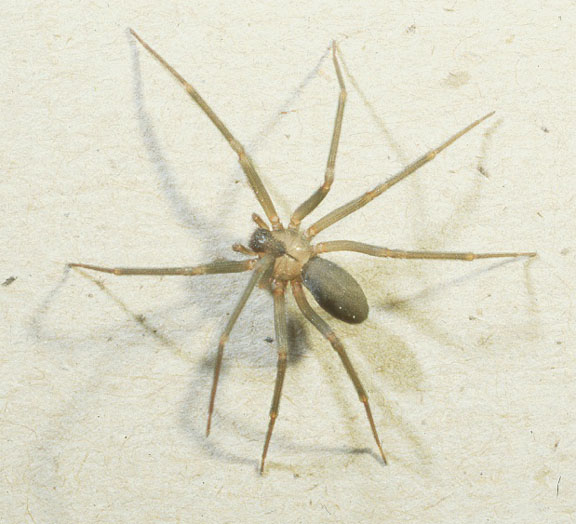Poisonous Spiders
Scouts are more likely to encounter scorpions and snakes in the outdoors than poisonous spiders. However, people tend to be more worried about spiders than other critters, so here are a few facts about Black Widows and Brown Recluse spiders, the only spiders you really need to worry about. Tarantulas, which are spiders you might encounter in dry climates, are mildly poisonous, and when they bite, they do bite hard. However, Tarantulas are quite passive, and only bite when provoked. To avoid being bitten, simply don't pick them up! Granted, this might be asking a lot from a scout, but a scout if bitten will survive with no ill effects once the tears dry up.  Black Widow Spiders
Where it lurks - Black Widows like to build webs in or under objects close to the ground. They are commonly found in stacks of firewood, storage sheds, water meter boxes, under porches, and in or around flower pots. They are not overly agressive, unless touched, and they rarely leave their webs, where they hang with their bellys pointed up. Most people are bit carrying firewood, or moving stacks of newspapers or magazines around in the garage. To avoid being bitten, wear gloves and long-sleeve shirts when handling firewood. How serious is the bite? - Although the venom of Black Widows is 15 times more deadly than that of most rattlesnakes, not much venom is injected in a bite, and the venom in small doses is not particularly potent. However, the Black Widow bite, like the sting of bees and wasps, can be fatal to some people. At least 4 deaths from Black Widows were reported in the U.S. between 1989 and 1999. The seriousness of a bite will depend upon the individual, where on the body they are bit, and how much venom is injected. Black Widow venom attacks the nervous system. Besides pain and minor swelling that may or may not result from a bite, symptoms include muscle cramps, convulsions, and/or stopped breathing. The few reported deaths in the U.S. resulted from respiratory failure. An anti-venom is available, but most people are simply kept under observation in a doctor's care for a few hours and sent home if serious symptoms do not result. Fortunately, the effects of most bites do not last long, and most people recover in a few hours.
 Brown Recluse and Fiddleback Spiders
Where it lurks - The Brown Recluse is an indoor spider that likes to build webs behind or beneath furniture and appliances, and in the corners of closets. They are commonly found in shoes and clothes that have not been worn for awhile, and in folded bedding that has been stored in a closet. Most people are bit putting on shoes or clothes that have not been recently worn. To avoid being bitten, shake out shoes and clothes before putting them on. How serious is the bite? - The Brown Recluse bite does not normally result in death. However, about 3 times as many people in the U.S. have died from Brown Recluse bites as have died from Black Widow bites. Because of this fact, and because of the long-lasting damage that often results from a bite, Brown Recluse are the more deadly spider. The seriousness of a bite will depend on the individual, where on the body they are bit, and how much venom is injected. Brown Recluse venom destroys tissue around the bite. Typically, a large swollen area develops not long after the initial bite, with a white blister on the actual bite. This blister soon develops into a "volcano lesion", characterized by a hole that extends into the wound and oozes puss. The hole is the result of gangrenous tissue that develops around the bite. No anti-venom is available, but Cortisone is often injected around the bite to help minimize tissue damage. Unfortunately, the effects of Brown Recluse bites are long lasting, and recovery can take weeks, even months. Plastic surgery is typically required afterwards. |

| Copyright 1999- - Southern Sierra High Adventure Team |

